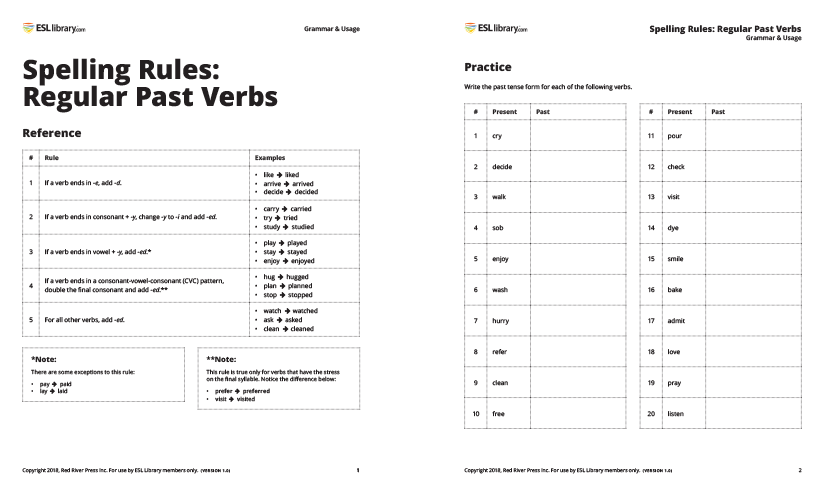Share this post
For the past few weeks at ESL Library, we’ve been stuck in the past! We’re rewriting our Simple Past lesson (in the Grammar Practice Worksheets section) to include grammar notes, speaking exercises, a writing exercise, and a quiz (available on June 1, 2018). This has inspired us to blog about the Pronunciation Rules of Past Tense Endings and has prompted us to make a new Grammar & Usage Resource on the Spelling Rules for Regular Past Verbs.
English spelling can be tough, but luckily there are some rules to help students in certain situations. While irregular past verbs have far too many spelling changes to list, forming the past tense for regular verbs is relatively easy. We thought we’d share these simple rules in this week’s blog post!
Rules
Go over the spelling rules and examples with your students. See if your students can think of other examples for each rule.
Rule #1
If a verb ends in -e, add -d.
- like → liked
- arrive → arrived
- decide → decided
Rule #2
If a verb ends in consonant + -y, change -y to -i and add -ed.
- carry → carried
- try → tried
- study → studied
Rule #3
If a verb ends in vowel + -y, add -ed.*
- play → played
- stay → stayed
- enjoy → enjoyed
Rule #4
If a verb ends in a consonant-vowel-consonant (CVC) pattern, double the final consonant and add -ed.**
- hug → hugged
- plan → planned
- stop → stopped
Rule #5
For all other verbs, add -ed.
- watch → watched
- ask → asked
- clean → cleaned
Notes
*Note 1:
There are some exceptions to Rule #3:
- pay → paid
- lay → laid
**Note 2:
Rule #4 is true only for verbs that have the stress on the final syllable. Notice the difference below:
- prefer → preferred
- visit → visited
Rule #4 also depends on which country’s spelling system you’re using. In the American spelling of words ending in the CVC with consonant + e + l, the final l will not double in the most commonly accepted form (e.g., travel → traveled, cancel → canceled). Most other English-speaking countries prefer to double the final l (e.g., travel → travelled, cancel → cancelled).
Practice
Write the following words on the board or print out the worksheet if you’re a subscriber. Have students write the past tense form for each of the following verbs.
- cry
- decide
- walk
- sob
- enjoy
- wash
- hurry
- refer
- clean
- free
- pour
- check
- visit
- dye
- smile
- bake
- admit
- love
- pray
- listen
Answer Key
- cried
- decided
- walked
- sobbed
- enjoyed
- washed
- hurried
- referred
- cleaned
- freed
- poured
- checked
- visited
- dyed
- smiled
- baked
- admitted
- loved
- prayed
- listened
Grammar & Usage – Spelling Rules for Regular Past Verbs
Related Materials
- Simple Past: Grammar Practice Worksheets
- Simple Past: Grammar Stories
- Simple Past: Fun Grammar Lessons
- Simple Past: Basic Grammar Sentences
- Spelling Rules for Regular Past Verbs: Grammar & Usage
- Pronunciation Rules for Regular Past Verbs: Grammar & Usage
- Irregular Verb List: Grammar & Usage
- Pronunciation of Past Tense Endings
- 5 Fun Activities for Irregular Verbs
Comments (6)
Anonymous A.(Teacher)
May 22, 2018 at 8:59 am

Tanya Trusler(Author)
May 23, 2018 at 12:26 am
Frédéric (Guest)
June 15, 2019 at 2:12 pm

Tanya Trusler(Author)
June 21, 2019 at 1:03 am
Anne H.(Teacher)
January 10, 2020 at 5:26 pm
Evelyn Chang(Guest)
July 24, 2020 at 3:48 pm

Tanya Trusler(Author)
July 24, 2020 at 5:25 pm
Anonymous A.(Member)
July 26, 2020 at 1:32 am
Dulce Anahì Gomez Zúñiga(Guest)
October 5, 2020 at 1:26 am

Tanya Trusler(Author)
October 5, 2020 at 5:51 pm
Raul Perez(Guest)
October 24, 2024 at 2:54 am

Tanya Trusler(Author)
October 24, 2024 at 4:15 pm

